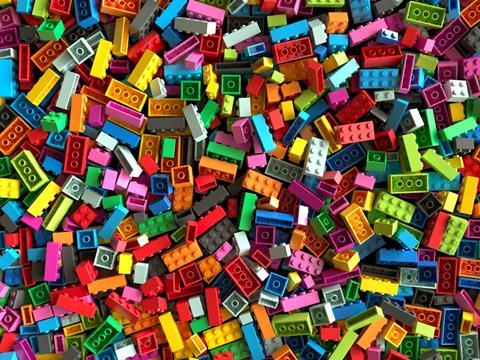
According to the Financial Times, Lego has reversed its decision to manufacture bricks from recycled plastic bottles, reporting that it has not reduced carbon emissions in comparison to virgin plastics made from crude oil.
Back in 2021, Lego announced its intent to phase crude oil out of its brick production within the following two years, with the BBC suggesting that around 80% of its annual brick output contained ABS. It turned to a prototype brick made from recycled PET.
While the company is still “fully committed” to finding an alternative material, further testing has apparently revealed that the prototype has not reduced Lego’s carbon emissions; the additional production processes apparently consume more energy.
“We tested hundreds and hundreds of materials,” CEO Niels Christiansen told Financial Times. “It’s just not been possible to find a material like that.”
Tim Brooks, vice president of sustainability, also commented: “In order to scale production, the level of disruption to the manufacturing environment was such that we needed to change everything in our factories. After all that, the carbon footprint would have been higher. It was disappointing.”
Lego reports that it is trying out various other materials in search of a sustainable solution, with a spokesperson telling the BBC that it will invest over $1.2 billion into its sustainability initiatives in the lead-up to 2025 – a contribution to its goals of utilising more sustainable materials and cutting its carbon emissions by 37% by 2032.
Other developments include the incorporation of bio-PE – said to be sourced from Brazilian sugarcane – into over 200 small elements of its toys, with guidance supplied by WWF. The company also announced its intention to remove single-use plastics from its boxes from 2020, and entered an agreement with Novo Nordisk and European Energy in April to use e-methanol as a lower-carbon alternative to conventional plastic production.
In another reversal of a sustainability initiative, Hasbro is re-integrating rPET and bio-PET windows and blisters back into its 6-inch figure packaging after its previous decision to phase out all plastics.
McDonald’s is also aiming to reduce plastics in its Happy Meal toys, as explained to us by Floor Uitterhoeve, Director for Market Sustainability in Europe.
If you liked this article, you might also enjoy:
The L’Oréal approach to packaging sustainability
What steps is Apple taking to make its packaging more sustainable?
How did Brazil achieve its 100% aluminium can recycling rate – and can it be replicated in the EU?
Experts have their say on the EU’s Packaging and Packaging Waste Directive revisions


















1 Reader's comment